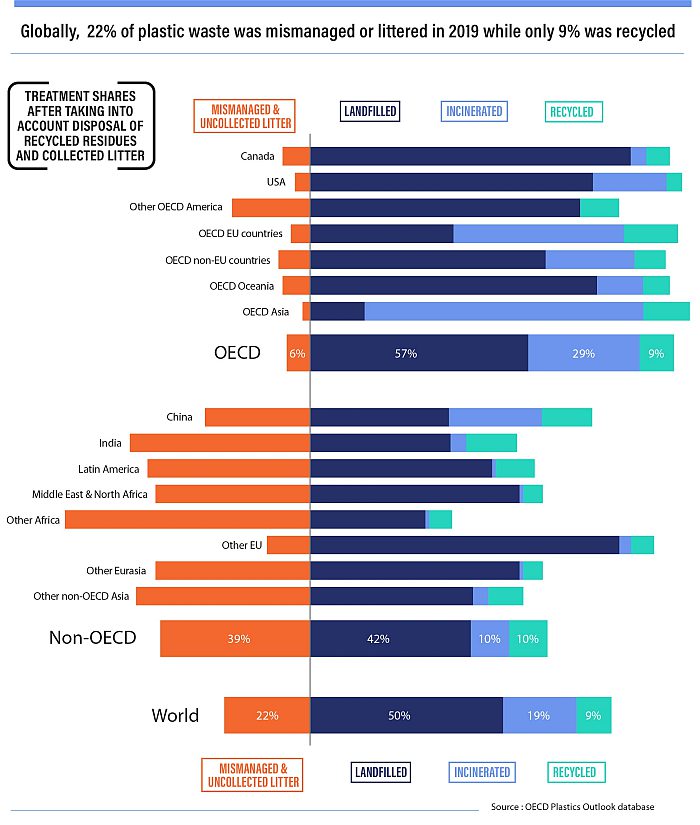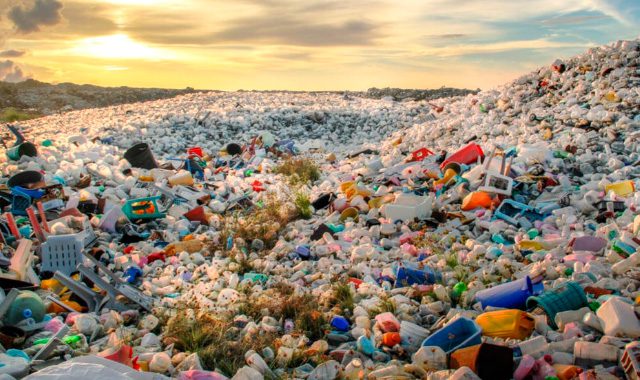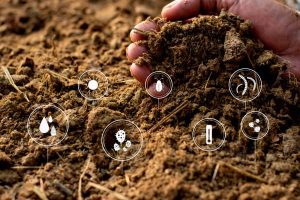The world is producing twice the amount of plastic as it did two decades ago and most of it is ending up in land ll, incinerated or leaking into the environment, according to a new report from the OECD.
The OECD said that rising populations and incomes are driving a ‘relentless increase’ in the amount of plastics produced globally. However, policies to curb leakage into the environment are ‘falling short’. Only 9% of the plastic produced today is successfully recycled, the Global Plastics Outlook – released today ahead of UN talks on plastic waste – revealed.
Almost half of all the plastic made originates from OECD’s 38 member countries. Plastic waste
per person varies from 221kg in the US to 114 kg in the European OECD countries and 69kg, on average, for Japan and Korea.
OECD countries are behind 14% of overall plastic leakage. Within that, OECD countries account for 11% of macroplastics leakage and 35% of microplastics leakage. The Outlook noted that international co-operation on reducing plastic pollution should include supporting lower-income countries in developing better waste management infrastructure to reduce their plastic leakage.

Addressing the plastic problem
The organisation noted bans and taxes on single-use plastics have been implemented in 120 countries. But they are ‘not doing enough’ to reduce overall pollution levels.
Bans and taxes on single-use plastics exist in more than 120 countries but are not doing enough to reduce overall pollution. “Most regulations are
limited to items like plastic bags, which make up a tiny share of plastic waste, and are more effective at reducing littering than curbing plastics consumption. Landfill and incineration taxes that incentivise recycling only exist in a minority of countries,” the Outlook noted.
The report authors urged greater use of instruments such as Extended Producer Responsibility schemes for packaging, land ll taxes, deposit-refund and Pay-as-You-Throw systems.
Global production of plastics from recycled plastics has more than quadrupled from 6.8 million tonnes (Mt) in 2000 to 29.1 Mt in 2019, but this is still only 6% of the size of total plastics production. ‘More needs to be done’, OECD stressed, to create a separate and well-funded market for recycled plastics in order to reduce reliance on virgin plastics, which are made from fossil fuels.
‘Our relationship with plastic needs to change’: Consumer Goods Forum
Responding to the report, Consumer Goods Forum Sustainability Director Ignacio Gavilan said the ndings came as ‘yet more evidence’ that ‘our relationship with plastic needs to change – and fast’.
CGF has brought together 42 corporations who represent more than 10% of the global packaging market through its Plastic Waste Coalition. Gavilan said this platform is ‘striving to deliver the solutions that industry can provide’.
E orts include Golden Design Rules providing an agreed template to accelerate a circular economy.
“One reason why plastic packaging ends up in nature is because of the complexity of the recycling process, which can be complicated by poor packaging
design, problematic materials and excess packaging. Our Golden Design Rules are already helping to combat these issues – and we now need even greater urgency across the industry, so that important design changes become the norm,” the sustainability expert explained.
“We champion a recipe that includes less and better plastics, and investments in a better system for collection, sorting and re-use/recycling. Well run Extended Producer Responsibility programmes are an important part of the answer, and we support their development through collaboration with governments to
help ensure systems are transparent and accountable. Basic enabling legislation is needed for all collection and recycling systems, including those supported by EPR.
“We also promote research and development to find sustainable alternative raw materials to reduce our dependency on plastics. And we want to end the export of plastic waste from country to country, which requires a commitment to investment in local systems and facilities across the world.”



